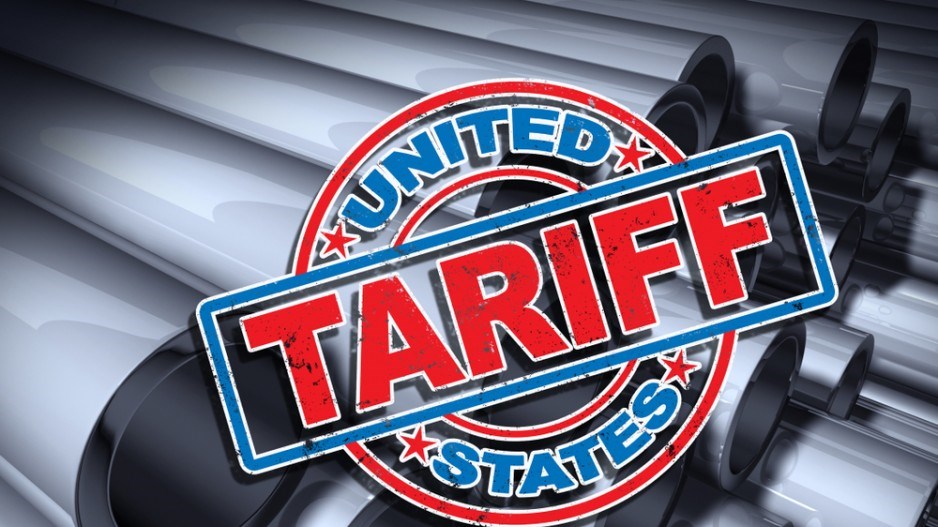Unless U.S. President Donald Trump executes one of his trademark flip-flops, Ottawa will mark Canada Day by hitting American companies with $16 billion worth of retaliatory tariffs and surtaxes that will apply to a wide range of basic grocery items – from grocery staples like Starbucks coffee and Heinz Ketchup to sailboats, dishwashing machines and whiskey.
The tariffs are in retaliation for American duties on Canadian steel (25%) and aluminum (10%) exports that were implemented May 31.
In addition to applying its own 25% and 10% duties on American steel and aluminum products, respectively, Canada is applying 10% surtaxes on a wide range of other American goods.
One of the major results of the escalating North American trade war is this: if it’s made in the U.S.A., it could cost Canadians more to buy after July 1.
However, it’s unlikely that a 10% tariff will necessarily translate into a 10% increase in the retail price for consumers, said Karl Littler, vice-president of public affairs for the Retail Council of Canada.
“That tariff is on the landed price, so essentially the price on importation to the retailer, or more probably to the retailer’s wholesaler,” Littler said. “That’s only one input to the price of goods, so it doesn’t mean that the retail price is going to go up by 10%.”
The impact on Canadian retailers and consumers will depend on how long the tariffs remain, he said, and to what degree American goods can be substituted with Canadian goods or products from other countries.
“Some of these goods are readily substitutable,” he pointed out.
For example, if Starbucks Corp. (Nasdaq:SBUX) coffee starts becoming too pricey, consumers might switch to a Canadian brand, like Kicking Horse Coffee, which is based in B.C.
“Where it becomes more challenging is on things like fresh orange juice,” Littler said. “If you’re determined to drink bourbon, there’s really only one source of supply.”
In addition to tariffs on a long list of steel and aluminum products, Canada is implementing a 10% surtax on a wide range of consumer goods, including:
•grocery goods and condiments, including coffee, chocolate, mustard, mayonnaise, ketchup, soy sauce, yogurt, strawberry jam, orange juice and soups;
•cleaning and personal hygiene products, including dishwasher detergents, aftershave, hair lacquers, skin products and toilet paper;
•chemical products, including insecticides, fungicides and herbicides;
•appliances and machinery, including refrigerator-freezers, lawn mowers and dishwashing machines;
•sailboats, motorboats and outboard motors;
•kitchenware, tableware, plywood and paperboard products; and
•miscellaneous items like sleeping bags, mattresses and ballpoint pens.
Andrew Wynn-Williams, Canadian Manufacturers and Exporters vice-president, said one B.C. manufacturer told him the Canadian tariff will cost his company an additional $45,000 per year.
Craig Patterson, founder and editor of Retail Insider, doubts the tariffs will persist for very long before the trade war between Canada and the U.S. gets resolved. But if it does persist and escalates, smaller retailers will be first in line for some pain.
“Retailers do risk alienating price-sensitive consumers if they do raise prices to a degree that consumers will see that increase and be angered by it.”
Patterson added that larger retailers like big grocery chains have more capacity to absorb price increases before passing them on to their customers.
But smaller retailers in B.C. might have a much harder time absorbing the extra costs, especially at a time when they’re also coping with a rising minimum wage, a new employer health tax and other tax and fee hikes.
Littler said some of the items on Canada’s list for tariffs appear designed to pressure Republicans who support President Trump’s steel and aluminum duties.
Chocolate, for example, is one of the items on the list, and one of the biggest chocolate makers in the world is the Hershey Co. (NYSE:HSY) in Hershey, Pennsylvania.
“Interestingly, the local congressman for Hershey, Pennsylvania, is retiring, and he’s a Republican,” Littler said. “The Canadian government has chosen a whole bunch of things that are particularly sensitive in a sizable number of vulnerable ridings for the Republicans. They’ve also tried to pick products for which there’s a substitute for the Canadian consumer.”
As for Canadian tariffs on steel and aluminum, Canadian manufacturers that use a lot of either metal might eventually have to switch their suppliers, said Werner Antweiler, an economist and associate professor at the University of British Columbia’s Sauder School of Business.
“First, they’re going to look inside the country,” he said. “So there’s going to be some adjustment that local producers will crank up their production. But beyond that, they’re going to look to Europe, they’re going to look to China, where we can actually buy those items for a lower price than we would be getting it now from the United States.”
Canada is not the only country that is retaliating against American steel and aluminum duties.
Mexico last week announced $3 billion worth of retaliatory tariffs on U.S. consumer goods, and the European Union announced $4 billion worth of tariffs on American steel, agricultural products, bourbon and other consumer goods.




